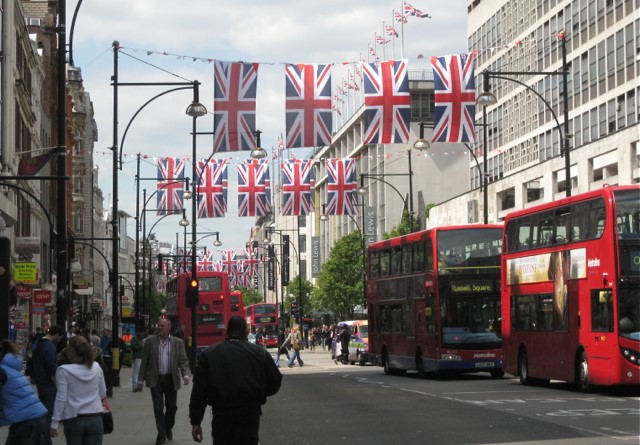The right have been allowed to dominate the patriotism issue for too long, argues Tristan Grove following the launch of a new Young Fabians pamphlet.

“Almost any English intellectual would be more ashamed of being caught standing to attention during God Save The King than of stealing from a poor box.”
So said George Orwell in 1941. On the face of it, it seems out of date. We don’t have a king, poor boxes are a thing of the past (though homelessness is more prevalent than ever), and far from standing to attention when the national anthem plays, the most you can generally hope for is grabbing shoulders with the person next to you and singing before the football.
In 2018, however, the sentiment of Orwell’s phrase rings truer than ever – nowhere more so than in the Labour Party.
Since its foundation, the Labour Party has been a delicate and often fraught balance of middle class, metropolitan intellectuals and the unionised working class. A party teetering between the bright young things of the Bloomsbury set and mine-forged Bevanites. It’s a tension that’s often proved fruitful – between the inspirational theories of middle-class intellectuals and the grounded power-broking of the trade union movement.
Historically, that tension has also helped keep Labour in touch with the country – helped it understand both liberal metropolitan hubs and also deprived industrial and post-industrial areas.
As Orwell pointed out (and often raged about), if there was one flashpoint for this class tension – one crack running down the middle of the Labour Party and the left – it was patriotism and national identity. While patriotism and small ‘c’ social conservatism historically run deep in Labour’s working-class heartlands, these concepts were always anathema to the party’s middle class, intellectual wing.
This issue never went away. What did shift, however, was the balance of power. Particularly amid the PR politics of the Blair years, when the party deliberately shifted to try and attract middle class votes, it moved away from the working-class side of the balance.
The big mistake is to think that the rise of Jeremy Corbyn has changed that. If anything, it has accelerated the party’s drift from its traditional working class base.
In the 2017 General Election, Labour made remarkable inroads into metropolitan, liberal areas like Kensington and Chelsea, but even as it did so, enormous cracks emerged in its traditional working class heartlands in the north and midlands. Not only did Labour lose seats like Mansfield, held since 1923; it saw majorities slashed in numerous similar seats.
The ethos of the party’s Islington-centric leadership may appeal to middle-class metropoles, but it is clearly alienating the party’s small ‘c’ conservative working class base. If Labour is to win the next election, it will need to reclaim this demographic.
The first step should be that same old ideological flashpoint: patriotism and national identity. Labour’s intellectuals might need, to channel Orwell again, to start standing to attention. There is, after all, a reason the UK’s right-wing tabloids have leapt on incidents like Corbyn not singing during the national anthem or opting for a white poppy over the traditional red. And there is a reason Theresa May attacked Corbyn so vociferously on foreign and defence policy in her conference speech. All of them smell an embarrassing weak spot for the leader and the party.
There is another, less psephological reason why Labour and the left should start considering patriotism and national identity again. Without the involvement of Labour and the left in the debate about national identity, the right has been allowed to dominate it.
Although today patriotism and national pride are associated with the right, this is not a natural or necessary state of affairs. Clement Attlee’s government was dominated by overtly patriotic former soldiers, including Attlee himself. Redistributing wealth and creating a welfare state for all British people were seen as patriotic enterprises – building the ‘new Jerusalem’.
The left can and should reclaim the debate about patriotism. As poll after level-pegged poll shows, the ‘one more heave strategy’ will not work. To win, Labour must appeal to its alienated, socially conservative and patriotic base. And in doing so, it can also reclaim the debate about patriotism.
As May noted in her conference speech, it’s about “patriotism, not nationalism”: the distinction is crucial. Labour can argue for a progressive, inclusive patriotism not based on ethnicity or exclusion, but the liberal values British people believe in.
As a new pamphlet by the Young Fabians – A Nation Divided – explores, Britain is more divided today than any time in recent history: over everything from generations and geography to wealth and education. And the answers to this cannot be purely economic. They must be cultural too.
So instead of the ethnic national identity the right have veered towards, we argue for a civic national identity, based on pride in local communities and the progressive values we share.
From the tone of Labour’s latest promotional video, you might suppose great minds are thinking alike…
Tristan Grove is a journalist and contributor to the Young Fabians’ ‘A Nation Divided: Building a United Kingdom’ pamphlet.
To reach hundreds of thousands of new readers we need to grow our donor base substantially.
That's why in 2024, we are seeking to generate 150 additional regular donors to support Left Foot Forward's work.
We still need another 117 people to donate to hit the target. You can help. Donate today.



